DUBAI: Dr. Farook Rasheed A Farooki was 29 years old when he left his home in Muzaffarabad- Kashmir to settle for a life as a young doctor in Jeddah, Saudi Arabia.
That was 45 years ago.
Soon, with his hardwork and excellent reputation, he became a naturalized citizen of the Kingdom. However, he says, his love for Pakistan always kept him grounded.
He finally decided to take the leap when, along with other like-minded Pakistanis, he established a charity hospital for kidney patients and named it as the Pakistan Kidney Center.
“In 1969, I came to Jeddah to look for a better life and got a job in the Ministry of Health. I worked there for eight years and then started my own clinic as a family physician. I worked very hard in my adopted country. And in return , I got a lot of respect and love. I was able to give a good life to my family,” the 76--year-old father of two said.
But that was not enough for him. “I always felt that I have a loan to pay to my motherland, where I was born and where I was educated.”
Eventually, he and his friend, Dr. Khaleelur Rehman, decided to establish two charity health projects in Pakistan — the Pakistan Kidney Center and Heath Mobile Units.
This was essential as Pakistan ranks eight in kidney diseases causing 20,000 deaths every year. Additionally, Chronic Kidney Disease (CKD) is rapidly growing in Pakistan, too.
“There are very few facilities available in our country, especially on the mountainous region. Patients have to travel a long way to major cities which add to the cost of their treatment. So we decided to build our center on the Silk Route’s main highway from Islamabad to Abbotabad, which is called Muslimabad,” he said.
The Pakistan Kidney Center was established in April 2015. With 14 machines, the facility provides 35 dialysis sessions on a daily basis.
“We successfully started our OPD with 14 dialysis machines [which works in two shifts] to take care of around 40 of patient every day. We maintain the highest standards. All machines are busy round the clock, so much so that we are now considering to start the third shift of dialysis,” Dr. Farooki said.
He added that the construction and operational costs of the facility cost him nearly Rs200 million. “Around Rs75 million was gathered through personal donations of board members and rest came from friends and philanthropists in KSA. Our current running cost is Rs2 to 2.5 million per month, out of which 25 to 30 percent is generated by center revenue. Rest comes from donations,” he said.
He has set his sights on launching a Mobile Health Unit next. “In the mountainous parts of Pakistan, there are no hospitals, no OPD facilities, or even trained medical staff. Hence, the only way to provide medical care they deserve is to reach them with Mobile OPDs on a regular basis,” he said, adding that “our mobile units travel to far-flung areas holding camps, providing medicine, and creating awareness about the prevention of diseases.”
His impending age and logistic challenges haven’t discouraged Dr. Farooki from serving his motherland. “I knew it won’t be easy. But nothing can stop me to help my people. Allah has given me the opportunity to serve my homeland. And I will do it with the best of my abilities till my last breath,” he said.
Dr. Farooki is not alone. Several other Pakistani expatriates in the Gulf voiced similar aspirations. Dr. Asjad Hameed, a famous diabetologist in the the UAE, is another such example.
Early this year, Dr. Hameed and his friends realized their six-year long dream by establishing a world-class diabetes hospital near Islamabad which they named The Diabetes Center.
Dr. Hameed, 51, has been working on curbing the nationwide epidemic of diabetes in Pakistan for more than a decade. Pakistan is one of the top ranked in the list of countries with diabetes where one out of five people suffers from the disease.
Dr. Hameed’s journey began in November 2011, when he decided to take the plunge. During a winter morning walk along the corniche, he shared his idea of establishing a hospital in Pakistan with two of his close friends.
Since then, there has been no looking back. “I initiated the project six years ago with my life’s savings of Dh300,000. We first launched a site clinic in Islamabad in 2012, where more than a 100 patients visited per day. And in April 2018, our world-class hospital became operational,” the father of three said, adding that “till date, we have spent Dhs 25 million on the hospital and are treating 200 patients per day.”
“We [Pakistani Gulf expatriates] are not only the highest in providing remittances to the country, we also serve our country in many ways. Contributing to the health sector is one such example. There are many known and many unsung heroes from the gulf countries who are serving Pakistan in several ways,” Dr. Hameed said.
“Though providing quality health services to all Pakistanis is the government’s job, we as responsible citizens cannot sit back and see our brothers and sisters suffering. We may have left our homes for the better future. But our heart and soul is still there. We will continue to do whatever we can. Keeping our people healthy is certainly one of such responsibilities that we owe to our country,” he said.
According to a report by the World Health Organization (WHO) issued in 2017, Pakistan spent 0.5 to 0.8 percent of its GDP on health care for the past 10 years while the WHO benchmark of health expenditure is at least 6 percent of the GDP to provide basic and lifesaving services.
‘We may have left our homes but our heart and soul are still in Pakistan’
‘We may have left our homes but our heart and soul are still in Pakistan’
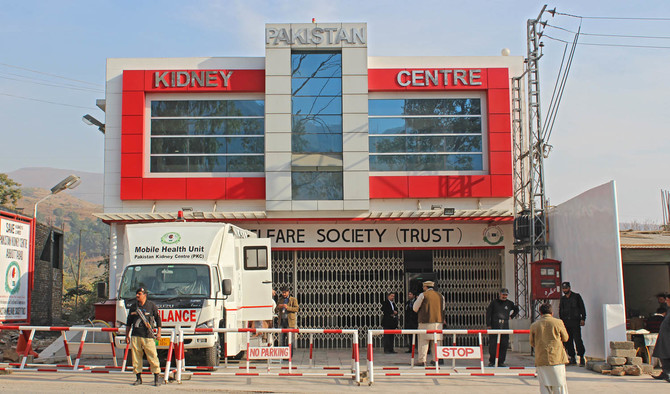
- Expatriates residing in the GCC look to pay back by contributing to the country’s health care sector
- Have played a crucial role in promoting quality facilities over the years
Pakistan’s finance minister says new IMF loan agreement targeted for early July
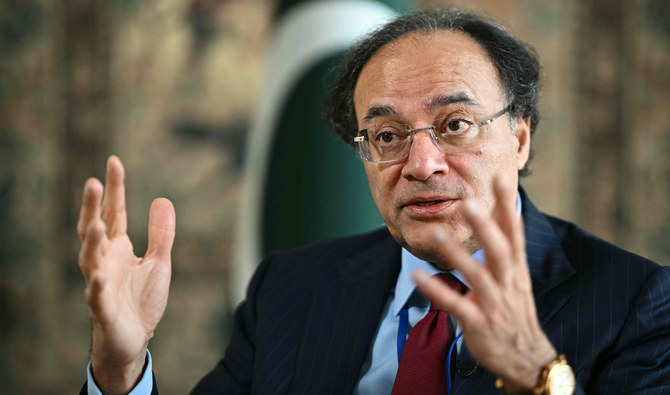
- The quantum and duration of new loan is still not clear, though the government wants at least a three-year program
- Muhammad Aurangzeb says the modalities of the new loan will be thrashed out with an IMF delegation next month
ISLAMABAD: Pakistan’s finance minister Muhammad Aurangzeb said on Tuesday the country planned to discuss the contours of a new loan program with an International Monetary Fund (IMF) delegation next month while hoping to reach a staff-level agreement with the global lender by early July.
Pakistan secured a $3 billion IMF bailout last year to avert a sovereign default and hopes to receive the final tranche later this month. However, the government wants a fresh IMF loan since the country continues to face tough economic challenges and plans to implement structural reforms.
“We are still hoping that we can get into a staff-level agreement by the time June is done or early July so that we can move on,” the finance minister said while addressing a news conference.
He informed he had had good discussions with IMF and World Bank officials during the spring meetings held by both international lending organizations in Washington.
Aurangzeb maintained it was not right to say that the IMF was imposing strict conditions on Pakistan since the country needed to carry out reforms on its own to strengthen its economy.
“This is Pakistan’s program which is helped, supported, assisted by the fund,” he said. “This is how we have to see it since this is the way ownership will come.”
He said the quantum and duration of the new IMF program was yet not clear, though the government wanted to secure at least a three-year loan package.
Both sides have said they were already in discussions for the new loan.
A formal request, however, will be made once the current facility expires, with the IMF board likely to meet late this month to approve the second and last tranche of the current support scheme.
The economy is expected to grow by 2.6 percent in the fiscal year 2024, the finance minister said, adding that the inflation was projected at 24 percent, down from 29.2 percent in fiscal 2023.
It touched a record high of 38 percent last May.
Aurangzeb said structural reforms would include increasing the government’s tax revenue-to-GDP ratio to 13 percent to 14 percent in the next two or three years from the current level of around 9 percent, reducing losses of state-owned enterprises through their privatization, and better management of the debt-laden energy sector.
With input from Reuters
Pakistan refiners warn $6 bln upgrades at risk due to fuel price deregulation plan
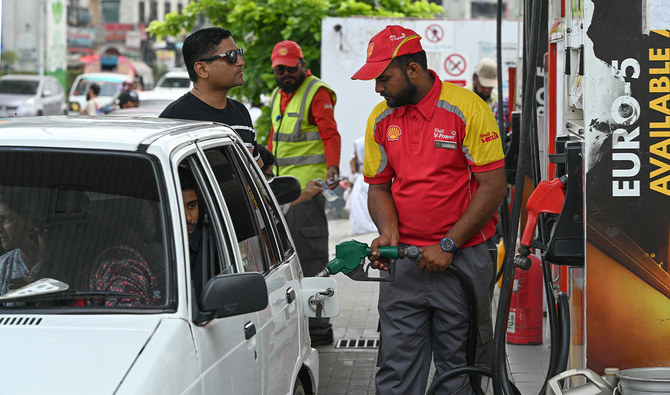
- Regulatory authority proposes oil marketers, refineries be allowed to set prices instead of government
- Refiners demand they be consulted before the implementation of “irrational recommendations”
KARACHI: Pakistan’s plans to deregulate fuel prices could lead refiners to halt planned upgrades worth up to $6 billion and force some refineries to close, some of the country’s top refiners said in a letter to the country’s oil regulator.
Looking to drive down prices for consumers, the South Asian nation’s Oil & Gas Regulatory Authority (OGRA) has proposed that oil marketers and refineries be allowed to set fuel prices, instead of the government setting prices.
As part of the change, OGRA proposed scrapping or reviewing a rule that requires fuel buyers to purchase supply from local refineries, another issue the refiners said could result in “disastrous consequences.”
The refiners — state-run Pakistan Refinery and private domestic refiners Pak Arab Refinery, Attock Refinery, Cinergyco, and National Refinery — said they were already struggling to operate near full capacity and asked that they be consulted before the implementation of “irrational recommendations.”
“The refining sector requires OGRA support through pragmatic and supportive measures, rather than suggesting ways that if implemented would result in their permanent closure,” the refiners told OGRA on Monday in a letter, which was reviewed by Reuters.
The deregulation was aimed at boosting competition and protecting the public interest, OGRA told Reuters in a statement on Tuesday, but did not respond to specific questions on the letter from the refiners. However, it said in an April 17 presentation reviewed by Reuters the potential impact of deregulation on refinery upgrades had to be assessed carefully, calling it a challenge.
“The refineries upgradation will bring in investment of $5 — 6 billion and not only result in cleaner environment friendly fuels but also result in savings of precious foreign exchange of the country,” the refiners wrote in the letter to OGRA.
Pakistan hopes to get new IMF loan by early July, says finance minister
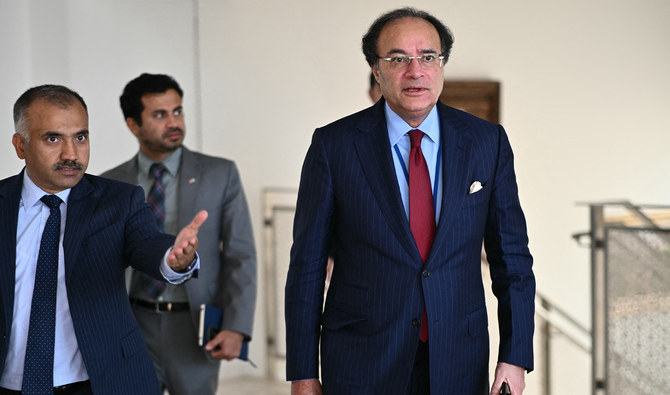
- Pakistan’s current $3 billion financial arrangement with IMF expires in late April
- Islamabad is seeking “bigger,” long-term loan to ensure macroeconomic stability
Pakistan is hoping to reach a staff-level agreement with the International Monetary Fund by June or early July, its finance minister said on Tuesday.
The country’s current $3 billion arrangement with the fund runs out in late-April, which it secured last summer to avert a sovereign default.
Islamabad is seeking a long-term bigger loan to help bring permanence to macroeconomic stability as well as an umbrella under which the country can execute structural reforms.
“We are still hoping that we get a staff-level agreement by June or early July,” Finance Minister Muhammad Aurangzeb told a conference in Islamabad.
He returned from Washington last week after leading a team to attend the IMF and World Bank’s spring meetings. “We had very good discussions in Washington,” he said.
He said he did not know at this stage the volume and tenure of the longer program.
Pakistan ‘rarely’ punished officials for rights abuses in 2023— State Department report
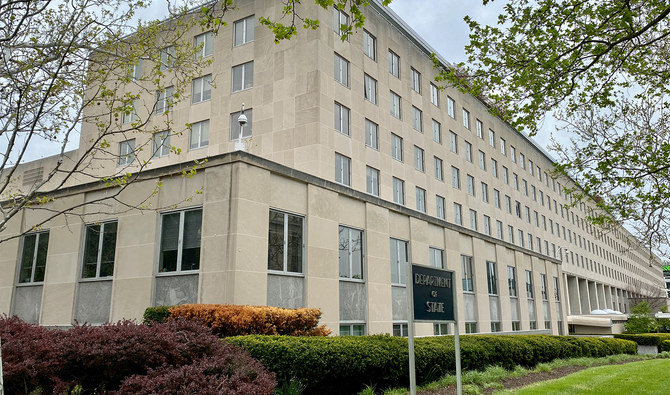
- US State Department releases annual “Country Reports on Human Rights Practices” for the year 2023
- Report says Pakistan witnessed extrajudicial killings, torture and restrictions on media freedoms last year
ISLAMABAD: Pakistan’s government “rarely” took steps to identify and punish officials who may have been involved in rights abuses in 2023, a report released by the US State Department said on Tuesday, pointing out incidents of extrajudicial killings, torture, enforced disappearances, violence against journalists and restrictions on media freedom had taken place in the country last year.
US Department of State released its annual “Country Reports on Human Rights Practices” to highlight rights issues in several countries, including Pakistan. In the report, Washington identified that Pakistan last year witnessed arbitrary killings, extrajudicial killings, enforced disappearance, torture and “cases of cruel, inhuman, or degrading treatment or punishment by the government or its agents.”
“The government rarely took credible steps to identify and punish officials who may have committed human rights abuses,” the report said.
Cases of “enforced disappearances” of citizens have long plagued Pakistan, where militants have waged a war against the state for decades. Families say people picked up by security forces often disappear for years, and are sometimes found dead, with no official explanation. Pakistani security agencies deny involvement in such disappearances.
The report also pointed out that last year Pakistan had seen incidents of restrictions on freedom of expression and media freedom, violence against journalists, unjustified arrests, disappearances of journalists, censorship and criminal defamation laws.
Pakistan’s recent actions to restrict Internet and mobile services throughout the country, especially on days when elections are held, have invited criticism from rights organizations and Washington. The interior ministry last week confirmed it had banned social media platform X in February to protect national security, maintain public order, and preserve the country’s “integrity.”
The State Department report further pointed out that rights issues in Pakistan during 2023 included extensive gender-based violence, including domestic or intimate partner violence, sexual violence, early, child and forced marriages. It said Pakistan had also reported incidents of female genital mutilation and crimes involving violence or threats of violence targeting members of religious, racial and ethnic minorities.
The report added that violence, abuse and social and religious intolerance by militant organizations and other non-state actors, both local and foreign, contributed to a culture of lawlessness in the country.
“Terrorist and cross-border militant attacks against civilians, soldiers, and police caused hundreds of casualties,” the report noted, crediting Pakistan’s military, police and other law enforcement agencies for carrying out “significant campaigns” against militants last year.
The South Asian country has seen an uptick in violence, mainly suicide attacks, since November 2022 when a fragile truce between militants and the state broke down. Pakistan has since then carried out military operations against the Pakistani Taliban or the Tehreek-e-Taliban Pakistan (TTP) and a Baloch separatist militant organization, the Balochistan Liberation Army (BLA) in the country’s two western provinces that border Afghanistan.
Iranian president in Lahore on second day of official visit to Pakistan
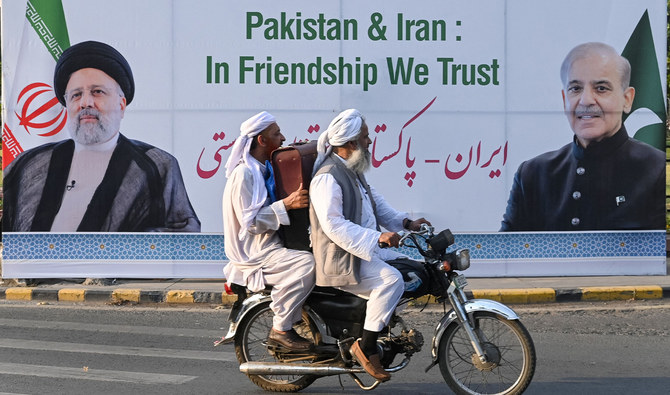
- On Monday, Islamabad and Tehran signed eight accords including on trade, technology, health, culture, information
- Interior ministers of Pakistan and Iran agree on joint action plan to deal with terrorism, smuggling, drug trafficking
ISLAMABAD: Iranian President Ebrahim Raisi arrived in Lahore on Tuesday on the second day of a three-day visit to Pakistan where he will meet top government officials and business leaders before traveling to the country’s commercial hub, Karachi.
Raisi arrived in Islamabad on Monday on a three-day visit as the two Muslim neighbors seek to mend ties after unprecedented tit-for-tat military strikes earlier this year. The Iranian official’s visit is the first by any head of state to Pakistan after the South Asian nation’s February general elections and the formation of a new government headed by Prime Minister Shehbaz Sharif. The visit also comes as tensions are high in the Middle East after Iran launched airstrikes on Israel a week ago and Israel retaliated with its own attack on Friday.
“Iranian President Syed Ibrahim Raisi has reached Lahore,” state television PTV reported, where he was received by Punjab Chief Minister Maryam Nawaz.
The Iranian president began his Lahore trip by visiting the mausoleum of Allama Muhammad Iqbal, Pakistan’s national poet, whose literary works in the Persian language have garnered him wide recognition in Iran.
After meetings in Lahore, Raisi will travel to Karachi, where he will hold meetings with the provincial leadership and be awarded an honorary doctorate by the University of Karachi, state-run Radio Pakistan reported.
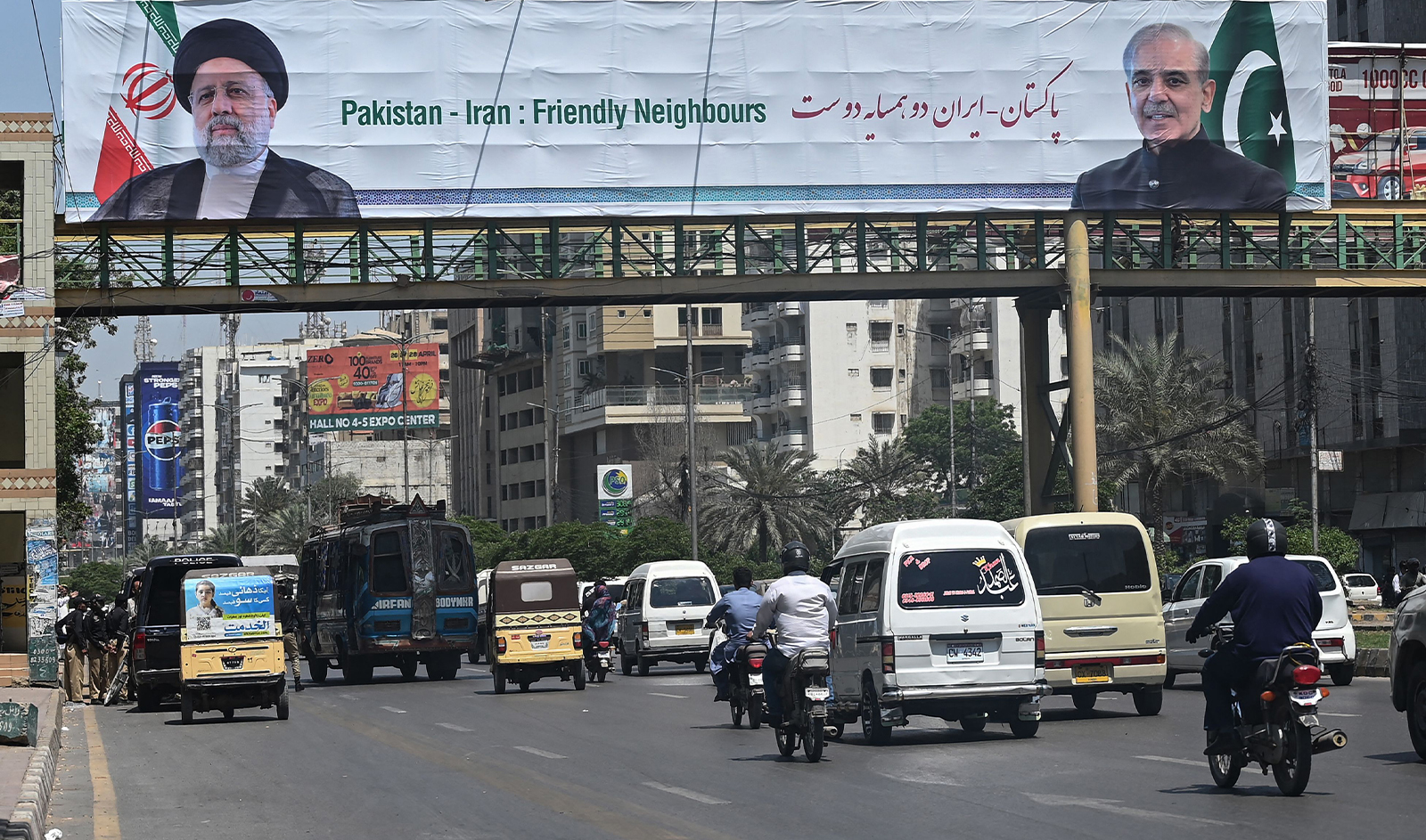
On Monday, Raisi held delegation-level meetings in the Pakistani capital as well as one-on-one discussions with the prime minister, president, army chief, chairman senate and speaker national assembly.
He also witnessed the signing of eight MoUs and agreements covering different fields including trade, science technology, agriculture, health, culture, and judicial matters. These include an MoU on the establishment of the Rimdan-Gabd Joint Free/Special Zone; on cooperation between the Ministry of Cooperative Labour and Social Welfare of Iran and the Ministry of Overseas Pakistani and Human Resources Development of Pakistan; on judicial assistance and legal cooperation at the ministry levels; on cooperation for animal hygiene and health; on mutual recognition in the field of quarantine and phytosanitary; and on the promotion of culture and films.
“The economic and trade volume between Iran and Pakistan is not acceptable at all and we have decided at the first step to increase the trade volume between our two countries to $10 billion,” Raisi said at a joint press conference with Sharif.
The interior ministers of Pakistan and Iran also met on Monday and discussed border management to prevent smuggling and drugs trafficking, and “decided in principle to ban terrorist organizations in their respective countries,” state news wire APP said.
“The two sides agreed on a joint plan of action to deal with the menace of terrorism being a common problem, with further improving mutual support and exchange of intelligence information.”
A security agreement regarding this decision would be signed “at the earliest,” APP added.
Pakistan and Iran have had a history of rocky relations despite a number of commercial pacts, with Islamabad being historically closer to Saudi Arabia and the United States.
Their highest profile agreement is a stalled gas supply deal signed in 2010 to build a pipeline from Iran’s South Fars gas field to Pakistan’s southern provinces of Balochistan and Sindh.
Pakistan and Iran are also often at odds over instability on their shared porous border, with both countries routinely trading blame for not rooting out militancy.
Tensions surged in January when Pakistan and Iran exchanged airstrikes, both claiming to target alleged militant hideouts in each other’s countries. Both sides have since then undertaken peace overtures and restored bilateral ties.












